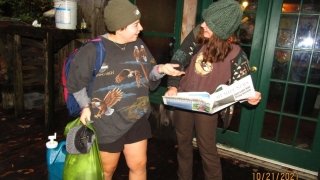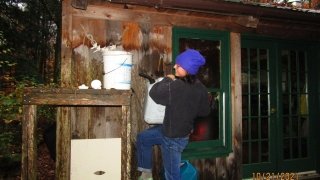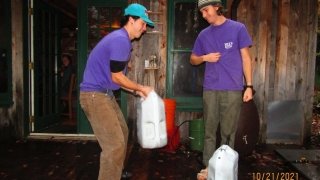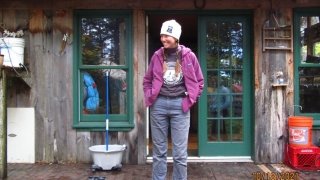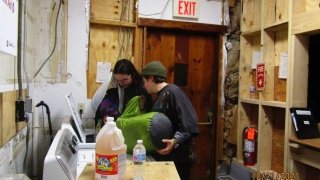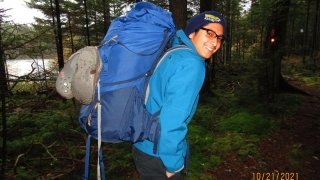Found Treasures
Roisin Creedon-Carey & Bri Duggan
Picture this: You’re at the Stewart’s in Tupper Lake on a cold Tuesday afternoon. It’s your lunch break, so you warm up with a bowl of $2.99 chili and a cup of their signature coffee. In the midst of catching up with a buddy, you witness ten disheveled, greasy college students march through the door in search of Impact Energy drinks and the limited-time fall-flavored ice cream. If you look closer, you will gaze upon a shirt still smudged with last week’s bread dough and multiple pairs of muddy jeans. Little do you know, one pair of pants came from Thrifty & Nifty, a local thrift store. That 90-miler shirt came directly from Michael Frenette’s closet. And that purple fleece hat? Borrowed from a yurt mate.
This year’s Arcadians have bonded over sharing the clothes we deemed worthy enough to pack for the semester. Seeing your sweater on someone else is a common occurrence around the yurt village. As the days get shorter, we desperately need a trip to Thrifty & Nifty to stock up on cozy layers. Unfortunately, the store is usually closed on our Tuesday town runs, which is why we are so grateful when our assistant director Amanda Colley surprises us with an impromptu trip after classes one day.
John Bernhardt, avid thrifter, current Arcadian, and former employee of the award-winning Wayzata Home Laundry in Minnesota, shares some of his fashion wisdom: “There’s lots of clothes in this world, and by thrifting you can turn something old into a new expression of yourself. There’s a story behind every article of clothing.”
Our clothes tell the story of Arcadia and reveal the gratitude we have for one another. That bread stain is from the loaf that sustained us at last week’s dinner. Those muddy pants are from kneeling on the ground to build a fire that would keep us warm and roast marshmallows for some yummy s’mores.
With shared community values of environmentalism and sustainability, we frequently discuss our impact on the planet. These values are woven into our daily lives here at Arcadia. We compost our waste (yes, all of it!), our lights are powered by solar panels, and our main mode of transportation is canoe. Because of this, our lives at Arcadia are often characterized by what we do not have: running water, technology, a microwave, and more than five pairs of underwear. But a different kind of abundance compensates for this lack of material items.
In Robin Wall Kimmerer’s book Braiding Sweetgrass, she discusses ways to create a “culture of gratitude.” Some essential practices to this culture are laid out in the “Honorable Harvest” chapter. See all the world as a gift. We practice this vision of gratitude in Cathy’s “Knowing Nature” class by documenting “pennies” in our journals, that is, small moments of awe throughout the day. Never waste what you have taken. Each salad is made of last night’s salad. Each leaf of lettuce, wilted or not, hits our tummies. Share. With different culinary backgrounds and dietary preferences, our cook groups share their creative tastes at every dinner, and in an effort to please everyone, new vegan recipes have seeped through the kitchen like osmosis. Give thanks for what has been given. Someone may think their selfless act of filling the straight lake jug went unnoticed, but each week our community meetings end with “warm and fuzzies,” that is, small notes of appreciation to let you know that your contributions to the community are valued. Give a gift in reciprocity for what you have received. To give back, a few students this year are planning to create a clothing bin where a flannel that doesn’t fit into a homeward-bound suitcase can warm next year’s Arcadians. Such small acts on a daily basis build our culture of gratitude at Arcadia.
After our Thrifty & Nifty trip, our found treasures need a quick wash. But the process is anything but quick. A mishmash of everyone’s smelly clothes is stuffed into laundry bags and piled into a canoe for the thirty-minute journey to our single washing machine in Gannett Lodge.
Someone shouts across the lake: “Hey guys! Can I throw my underwear in with anyone’s load? I just need clean undies this week.”
Someone else yells back: “I have room in my bag!”
Three hours later, our laundry is slightly cleaner, and exhaustion sets in as we paddle back to Arcadia. We are content knowing that we can be warm, stylish, and somewhat disheveled for another week. We rest assured that if we are ever lacking, a toasty pair of socks or clean shirt will be eagerly given by a friend. Our fostered culture of gratitude can be seen in our physical appearance but also in our daily acts of kindness and cooperation.

